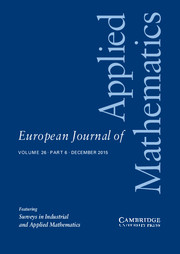Article contents
Exact bounds for lift-to-drag ratios of profiles in the Helmholtz–Kirchhoff flow
Published online by Cambridge University Press: 17 January 2014
Abstract
In this work we investigate limiting values of the lift and drag coefficients of profiles in the Helmholtz–Kirchhoff (infinite cavity) flow. The coefficients are based on the wetted arc length of profile surfaces. The problem is to find global minimum and maximum values of the drag coefficient CD under a given lift coefficient CL. We reduce the problem to a constrained problem of calculus of variations and solve it analytically. In so doing we do not only determine extremals but also strictly prove that these extremals realize global extrema. The proofs are based on non-trivial application of Jensen's inequality. The solution of the problem allows us to construct the domain of possible variations of coefficients CL and CD and define maximum and minimum values of the lift-to-drag ratios CL/CD for a given CL.
Keywords
Information
- Type
- Papers
- Information
- Copyright
- Copyright © Cambridge University Press 2014
References
- 3
- Cited by

